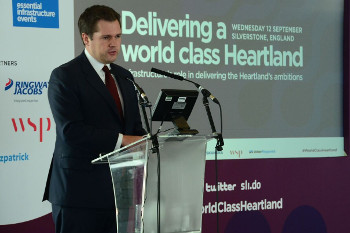Ministers have called for more use of offsite assembly and digital technology after publishing a £600bn pipeline of infrastructure spending.
The National Infrastructure and Construction Pipeline includes schemes announced in the Budget, such as the £28bn National Roads Fund and flagship projects such as East West Rail and upgrading the M6 to an all lane running smart motorway.

Robert Jenrick at a recent event
The Treasury said that to increase efficiency in these projects ministers are encouraging greater use of more modern approaches to construction, including modular construction using the latest digital technology prior to assembly on construction sites.
The Government has committed to increasing use of these methods in public-funded projects and launched a call for evidence on a ‘New Approach to Building’.
Robert Jenrick, exchequer secretary to the Treasury, said: ‘As the pace of technological change accelerates, we are stepping up our commitment to digital infrastructure, use of data to drive greater productivity and embrace new methods of construction.
‘With £600bn of investment over the next decade, including the largest ever investment in our strategic road network, we are taking the long-term action required to raise productivity and ensure the economy is fit for the future.’
Highways England chief executive Jim O’Sullivan said: ‘At Highways England we recognise the productivity and efficiency challenges that the U.K. construction industry is facing. In recent years we have encouraged more computer-led design, automation, and pre-assembly across all of our construction activities.
‘As well as driving productivity and efficiency, it improves worker safety and reduces delays and frustration for road users passing through our works.'
He added: ‘We will adopt ever increasing levels of automation and off-site construction on road improvement schemes and smart motorways in our next five-year road investment programme.’
The Treasury said that, despite significant contributions to the UK economy, the construction sector’s productivity is weak compared to sectors like manufacturing.
As a positive example of modern construction techniques, it cited the the A14 Cambridge to Huntingdon improvement scheme (pictured), where parts of bridges were developed in a factory and therefore built more efficiently than using traditional methods.
Marie-Claude Hemming, director of external affairs at the Civil Engineering Contractors Association, said: 'Delivery of such substantial investment to drive economic growth, goes hand in hand with driving greater efficiencies and exploring opportunities for transformative innovations where possible.
'To this end, we look forward to working with Government and the wider industry to ensure this pipeline is delivered effectively, drawing where we can upon the new technologies available.'
Register now for full access
Register just once to get unrestricted, real-time coverage of the issues and challenges facing UK transport and highways engineers.
Full website content includes the latest news, exclusive commentary from leading industry figures and detailed topical analysis of the highways, transportation, environment and place-shaping sectors.
Use the link below to register your details for full, free access.
Already a registered? Login